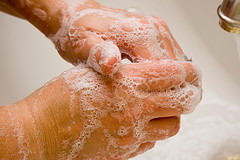 Grab a cake of soap, turn on the tap and celebrate Global Handwashing Day this Friday 15 October.
Grab a cake of soap, turn on the tap and celebrate Global Handwashing Day this Friday 15 October.
Hands are the principal carriers of disease-causing germs. Handwashing with soap is like a do-it-yourself vaccine, which can help prevent illnesses like diarrhoea, respiratory infections, intestinal worms, skin infections and eye infections.
According to UNICEF, 3.5 million children under five die every year in developing countries because of diarrhoea and pneumonia. An estimated one million of those lives could be saved by handwashing with soap.
Lack of handwashing with soap is not only a problem in developing countries. Even in places where it is an entrenched practice, and both soap and water are plentiful, people often fail to wash their hands with soap. A study in England found that people washed their hands only about half the time after wiping a child’s bottom; a study of doctors’ handwashing practices in the USA revealed that they failed to wash their hands with soap between patient visits with surprising frequency.
Encourage lifelong healthy habits by teaching children about the benefits of handwashing with soap. Set a good example for your child by always washing your own hands with soap after using the toilet (or cleaning a child’s bottom), before handling food and before eating or feeding a child. It’s also a wise idea to wash your hands as soon as you arrive home. Keep a step beside the sink to ensure children can always wash their own hands.
To wash hands properly:
- Cover wet hands with soap.
- Scrub all surfaces, including palms, back, between the fingers, and especially under fingernails for about 20 seconds
- Rinse well with running water rather than still water
- Dry on a clean cloth or by waving in the air.
An easy way to gauge 20 seconds is to find a familiar song that takes about that long to sing; for example, it takes about 20 seconds to sing the “Happy Birthday” song twice.
Remember, the more common practice of rinsing hands with water alone is significantly less effective than washing hands with soap. Germs lodge in the natural oils of hands and water alone will not dislodge them. Using soap adds to the time spent washing, removes the oils carrying most germs, and leaves hands smelling pleasant. With proper use, all soaps are equally effective at removing germs. However, it’s best to use a soap you like the smell and feel of (you’re more likely to use it).
Source: Health in your hands, the Global Public-Private Partnership for Handwashing with Soap
Australian Sonia Cahill is a busy mum of three. When she’s not looking after her girls, she works as an editor and pen-for-hire.



